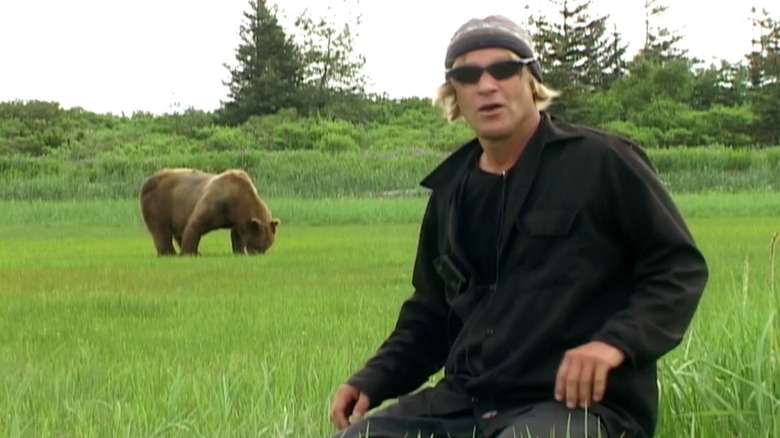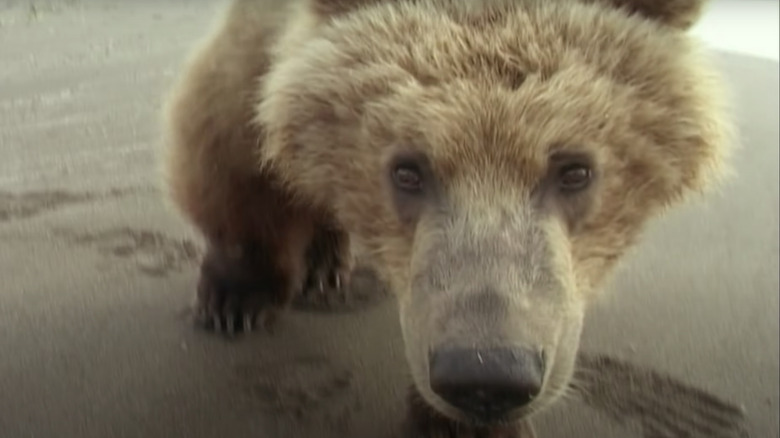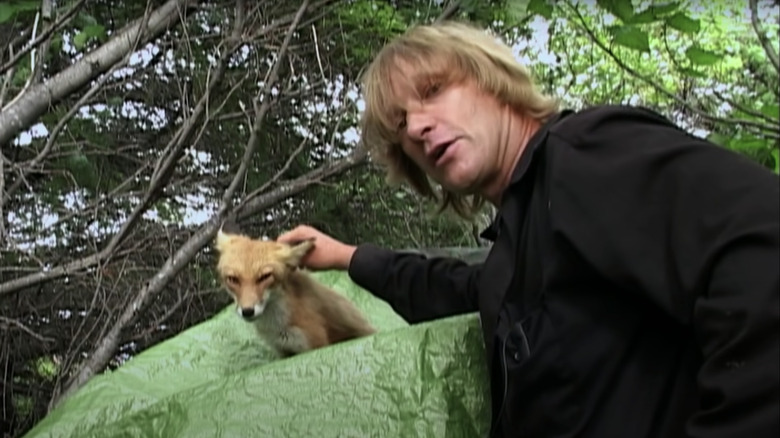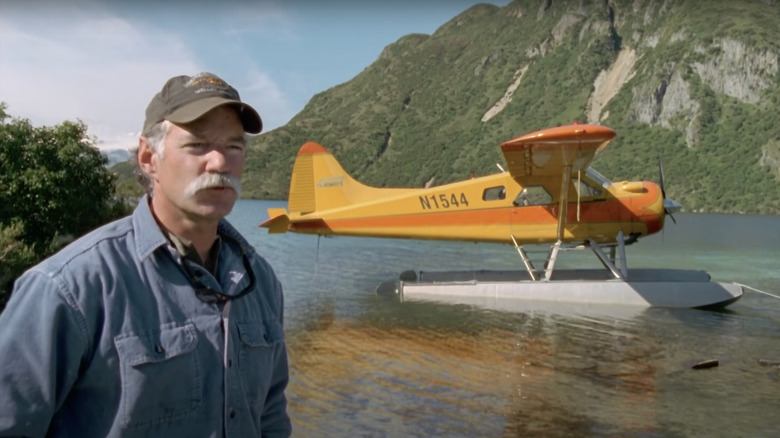The Daily Stream: Werner Herzog's Grizzly Man Is A Sobering Reminder Of Our Place In The Natural World
(Welcome to The Daily Stream, an ongoing series in which the /Film team shares what they've been watching, why it's worth checking out, and where you can stream it.)
The Movie: "Grizzly Man"
Where You Can Stream It: The Roku Channel, Kanopy (free with library card)
The Pitch: Real found footage helps craft a documentary portrait of Timothy Treadwell, the quixotic bear enthusiast who lived among grizzlies — until he was killed by one.
Werner Herzog writes, directs, and narrates "Grizzly Man," which also utilizes interviews with people who knew Treadwell or were connected to him, such as the airplane pilot who went to pick him up, and the coroner who examined his remains. Treadmill and his girlfriend, Amie Huguenard, were camping in Katmai National Park and Preserve in Alaska when they were attacked and eaten by a brown bear. Treadwell had spent years documenting his interactions with the bears, becoming a minor celebrity and appearing on the Discovery Channel and programs like "Dateline NBC" and "The Late Show with David Letterman" prior to his death.
"Grizzly Man" is a character study that is equal parts sad, surreal, and disturbing. As the viewer gets to know this eccentric man with a Prince Valiant haircut, who sleeps with teddy bears in his tent and vents his feelings to foxes, they could be forgiven for wondering, "Is this guy for real?" It has the reverse effect of "The Blair Witch Project," the found-footage horror film famously thought real by some moviegoers, in that it almost seems like a mockumentary at first. Yet all of this really happened: Treadwell thought he was living in harmony with nature, until he met the real nature, red in tooth and bear claw.
Why it's essential viewing
"Grizzly Man" is a documentary that peels back the layers of its subject until what's left is an elemental cautionary tale with the always-useful lesson that the world does not revolve around us. It would be easy to dismiss Treadwell, the self-described "lone guardian of the grizzlies," as an annoying, foolhardy individual who tempted fate and got what was coming to him. There are, in fact, one or more talking heads who do appear onscreen and voice sentiments to that effect. However, Herzog sees something more in Treadwell's footage. As he puts it:
"I discovered a film of human ecstasies and darkest inner turmoil. As if there was a desire in him to leave the confinements of his humanness and bond with the bears. Treadwill reached out, seeking a primordial encounter. But in doing so, he crossed an invisible borderline."
This is a guy, separated from the outside world by a glacier (one that functions as both literal and figurative ice wall), who tried to fill the hole in his psyche with bears. In college, Treadwell developed a drinking problem, lost his diving scholarship, and wanted a fresh start, so he moved out to California, where he auditioned for the role of the bartender on "Cheers" but lost out to Woody Harrelson. As he lived the American dream of constantly reinventing oneself, the failed actor in him also affected a new Australian persona and had a near-fatal drug overdose.
Doctors wanted to put Treadwell on antidepressants to regulate his mood swings, but the documentary seems to indicate that he wanted to keep the high highs and low lows going in his life. This occasionally leaves him engaging in vitriolic rants against the National Park Service and human civilization in general.
A pre-YouTube martyr for lost causes
At one point, Herzog equates Treadwell to his own frequent collaborator, Klaus Kinski ("Aguirre, the Wrath of God," "Nosferatu the Vampyre"), saying: "The actor in his film has taken over from the filmmaker. I have seen this madness before on a film set."
"Grizzly Man" came out in 2005, the year YouTube launched, and in the wilderness, Treadmill manifests an egocentric kind of pre-YouTube vanity as he prays for rain — and gets it — and makes self-congratulatory statements like, "I have no idea if there's a God, but if there's a God, God would be very, very pleased with me." Elsewhere, he refers to his troubles with the opposite sex, touting his own bedroom prowess and harping on homosexuality with comments such as, "I've always wished I was gay," and, "Alas, Timothy Treadwill is not gay. Bummer. I love girls."
The viewer is left to wonder if he was in denial about his sexuality or if he was just lonely and had a death wish. Treadwell regards himself as one of the bears and thinks he's respectful of them, but he plainly lacks the healthy instinct of fear or respect that would keep most people from getting up close and personal with wild animals that could easily maul them. He also indirectly winds up getting bears killed after his death, something that runs contrary to his whole caretaking mission.
In life, there was a genuine affinity Treadwell had for these animals, even if his nebulous environmental concerns about elusive poachers are only halfway borne out onscreen by a single encounter where he sees some guys throwing rocks at a bear, and they leave the local bear protector a smiley face and "See you next summer" message.
'No such thing as a secret world of the bears'
One interviewee in "Grizzly Man" suggests Treadwell "felt not worthy enough to get his message across at times, and so maybe, in the drama of death, his message would be more poignant and reach out to more people."
Less is known about Huguenard, who avoided showing her face in Treadwell's videos and whose family and friends understandably did not want to participate in a documentary about the man who put her in circumstances leading to her death. We hear descriptions of what happened to her and Treadwell and see Herzog listening to the audiotape of the attack, but the only snuff film here is the one that exists in the imagination, as the tragedy of "Grizzly Man" plays out to sobering effect.
One particularly vivid minds'-eye image comes when the pilot who found Treadwell's remains describes looking down from low in the air and seeing the bear eating a human rib cage. A severed arm with Treadwell's wristwatch on it turns up, and details like these go a long way toward reconstructing a harsh yet truthful picture of a man who — in the midst of what appear to have been mental health struggles — understood too late, perhaps, his place in the universe. The final judgment belongs to Herzog, who roundly observes:
"What haunts me is that in all the faces of all the bears that Treadwell ever filmed, I discover no kinship, no understanding, no mercy. I see only the overwhelming indifference of nature. To me, there is no such thing as a secret world of the bears. And this blank stare speaks only of a half-bored interest in food."



